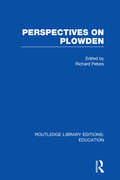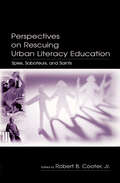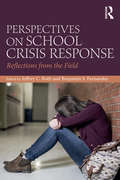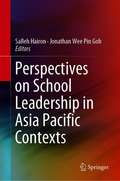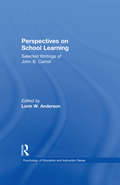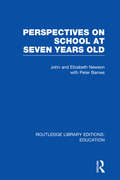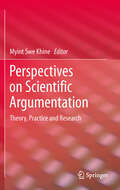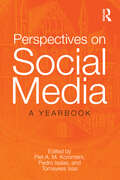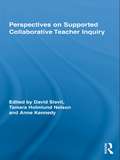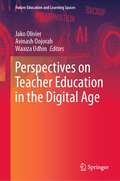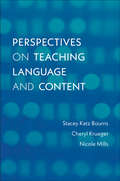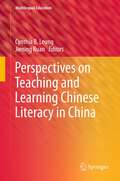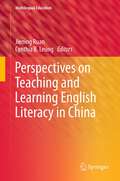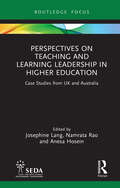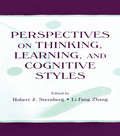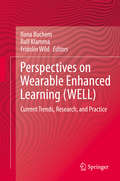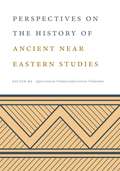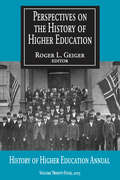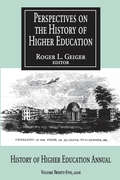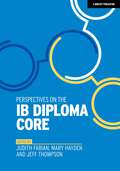- Table View
- List View
Perspectives on Plowden (Routledge Library Editions: Education)
by Richard PetersThe Plowden Report, Children and their Primary Schools (1967), had a huge impact on education in the latter 20th century, but at the time was labelled as left-wing, and of no practical use to the problems of education in the 1960s. The contributors to this volume were all concerned with the educational thinking of the Plowden Report, and its appropriateness or otherwise to the educational needs of the day. In quarters where the Plowden Report was treated as an authoritative textbook, the views in this volume provide a valuable critique.
Perspectives on Rescuing Urban Literacy Education: Spies, Saboteurs, and Saints
by Robert B. CooterPerspectives on Rescuing Urban Literacy Education: Spies, Saboteurs, and Saints is an exploration of the variables that contribute to the improvement of literacy instruction in large urban school districts. The book grows out of a five-year initiative known as The Dallas Reading Plan--a $50 million collaborative effort between area business and corporate interests, philanthropy, and the Dallas Independent School District. Audiences include university professors and graduate students in reading/literacy education, educational leadership, special education, urban studies, and change management theory, school board members, business and community leaders, classroom teachers, parents, and those concerned with the status of literacy education in urban settings.
Perspectives on School Crisis Response: Reflections from the Field
by Jeffrey C. Roth Benjamin S. FernandezThis book offers a unique collection of narrative case studies that capture the responses of mental health professionals to tragedies in schools and are designed to connect key concepts and skills with real life application. By citing evidence-based theories and interventions with vivid real world accounts, this volume aims to highlight the multi-phased, multi-disciplinary nature of school crisis response while emphasizing the need for effective coordination and collaboration. It provides a powerful professional development resource for school crisis teams, psychologists, counselors, social workers, nurses, resource officers, administrators and teachers, and training university students, who will face similar situations.
Perspectives on School Leadership in Asia Pacific Contexts
by Salleh Hairon Jonathan Wee Pin GohThis book casts a refreshingly new light on current literature on school leadership, which has predominantly been viewed through Western lenses. Accordingly, key concepts and theories on leadership and school leadership have primarily been generated from thinking and research in the Western sphere. This is problematic, considering the fact that the leadership concept or construct, and its practices, are significantly influenced and shaped by contexts, and even situations. However, there are various contextual conditions and forces that can separately or collectively affect how school leadership is understood and practiced, including social, cultural, historical, geographical, economic and political conditions.In response, the book seeks to provide readers a better awareness of how the leadership construct or phenomenon is shaped by the varying contexts constantly affecting school leadership, while specifically focusing on the Asia Pacific region. In turn, it highlights various Asia Pacific contexts that shape school leadership, so as to ‘speak back’ to existing theories on school leadership.
Perspectives on School Learning: Selected Writings of John B. Carroll (Psychology of Education and Instruction Series)
by Lorin W. AndersonFirst Published in 1985. Routledge is an imprint of Taylor & Francis, an informa company.
Perspectives on School at Seven Years Old (Routledge Library Editions: Education)
by Peter Barnes John Elizabeth NewsonThis volume looks at the social and intellectual forces which the child encounters in class-room and playground from the parent’s point of view. School and home are seen as the separate yet overlapping worlds of childhood – for some children more uncompromisingly separated than for others. In the social development of the child, school functions as a link between the kinds of demands (and immunities) which are characteristic of family life, and those which the child will discover in the wider society of adulthood. The authors provide a meeting-point for developmental psychology, sociology and education, to the illumination of all three. There is a concern with the daily life of ‘ordinary’children in ‘ordinary’ families. School reluctance – rather than the more clinical school phobia or truancy – is delicately probed. The back-up that parents provide at home, directly or indirectly, is objectively evaluated, yet with empathy for parents’ and teachers’ anxieties about their roles.
Perspectives on Scientific Argumentation
by Myint Swe KhineArgumentation--arriving at conclusions on a topic through a process of logical reasoning that includes debate and persuasion-- has in recent years emerged as a central topic of discussion among science educators and researchers. There is now a firm and general belief that fostering argumentation in learning activities can develop students' critical thinking and reasoning skills, and that dialogic and collaborative inquiries are key precursors to an engagement in scientific argumentation. It is also reckoned that argumentation helps students assimilate knowledge and generate complex meaning. The consensus among educators is that involving students in scientific argumentation must play a critical role in the education process itself. Recent analysis of research trends in science education indicates that argumentation is now the most prevalent research topic in the literature. This book attempts to consolidate contemporary thinking and research on the role of scientific argumentation in education. Perspectives on Scientific Argumentation brings together prominent scholars in the field to share the sum of their knowledge about the place of scientific argumentation in teaching and learning. Chapters explore scientific argumentation as a means of addressing and solving problems in conceptual change, reasoning, knowledge-building and the promotion of scientific literacy. Others interrogate topics such as the importance of language, discursive practice, social interactions and culture in the classroom. The material in this book, which features intervention studies, discourse analyses, classroom-based experiments, anthropological observations, and design-based research, will inform theoretical frameworks and changing pedagogical practices as well as encourage new avenues of research.
Perspectives on Social Media: A Yearbook
by Pedro Isaias Tomayess Issa Piet KommersPerspectives on Social Media presents the most current research on the effectiveness of social media across sectors. Progress in finding better applications for social media relies on the difficult task of integrating media technologies into fields such as engineering, marketing, health, learning, art, tourism, and the service industry. This book is based on cutting-edge creative work among top international researchers and renowned designers and provides readers with a preview of the most visionary outcomes in the field of social media. Some of the major topics that the book discusses are: New social media design Sense of community in web applications App design and development for mobile devices. Perspectives on Social Media uniquely builds on recent disputes among the top scholars around the world, thus including the dynamics of knowledge-sharing and cross-fertilization that one would expect to happen on the web but that are rarely found in a book.
Perspectives on Supported Collaborative Teacher Inquiry (Routledge Research in Education)
by Anne Kennedy David Slavit Tamara Holmlund NelsonSupported collaborative teacher inquiry (SCTI) describes the process of professional development in which teacher teams build collaborative structures for the purpose of inquiring into aspects of their own instructional practice. Professional development performed collaboratively and grounded in "the work teachers do" is a highly effective forum for challenging existing beliefs about content, learners, and teaching and using data and research to reflect on, and possibly change, instructional practice. The contributors to this volume describe supported collaborative inquiry as a framework for teacher professional development and provide specific empirical evidence found in examples of SCTI. The chapters focus on the building of collaborative support structures, nurturing an inquiry stance, progressing through an inquiry process, and the various kinds of support mechanisms necessary to engage in SCTI. This seminal work in teacher research will be of interest to scholars, students, teachers, and administrators seeking insight into teacher education, teacher leadership, and teacher inquiry.
Perspectives on Teacher Education in the Digital Age (Future Education and Learning Spaces)
by Jako Olivier Avinash Oojorah Waaiza UdhinThis book relates to the experiences and initiatives of teacher education institutions in the Southern Africa region to empower teachers to cope with teaching and learning in the digital age. The book covers the impacts of digital technologies on the teaching and learning process. Online and blended learning, digital pedagogies, the design of curricula and learning experiences to address the learning needs and profile of learners are considered in this book. Furthermore, the way in which pre- and in-service teachers learn about alternative modes of assessment will also be considered. In this regard, innovative concepts such as renewable and situated assessments, multimodal assessments, digital storytelling and e-portfolios, amongst others, were explored.
Perspectives on Teaching Language and Content
by Stacey Katz Bourns Cheryl Krueger Nicole MillsAn overview of current issues and developments in foreign language education, designed for instructors of language, literature, and culture at any stage of their careers A contemporary guide to language teaching, this book presents the latest developments and issues in the field of applied linguistics. Written by scholars with expertise in theoretical linguistics, literary and cultural studies, and education, the book encourages readers to examine their beliefs about language teaching and to compare these perspectives with the tenets of current research-supported frameworks and approaches. It also leads instructors to make vital connections between theory and practice while linking language and content pedagogy so that they may develop innovative lesson plans, classroom activities, and course materials that align with the specific contexts in which they teach. Serving as a textbook for teaching methods courses, as well as a reference for instructors with varying levels of experience and diverse specializations, the book is applicable to all levels of instruction and provides guidelines and models that prepare instructors to teach in a rapidly evolving field.
Perspectives on Teaching and Learning Chinese Literacy in China
by Cynthia Leung Jiening RuanThis is one of two volumes by the same editors that explore historical, philosophical, and cultural perspectives on literacy in China. This volume focuses on Chinese literacy, while the other volume is on English literacy. Since the founding of the People's Republic of China, the country has witnessed a dramatic increase in its literacy rate, but not without challenges. The essays in this volume provide a comprehensive, cross-disciplinary look at changes in Chinese literacy education from ancient times to the modern day. Together, the essays address a wide array of topics, including early Chinese literacy development, children's literature, foreign translated literature, and uses of information technology to teach Chinese. This authoritative text brings clarity and precision to the field and serves as a vital core resource for those who want to expand their understanding of Chinese literacy education. Its scope is unmatched even in academic literature in the Chinese language.
Perspectives on Teaching and Learning English Literacy in China (Multilingual Education #3)
by Cynthia Leung Jiening RuanThis is one of two volumes by the same editors that explore historical, philosophical, and cultural perspectives on literacy in China. This volume focuses on English literacy in China, while the other volume is on Chinese literacy. In modern day China, English has enjoyed an increasingly important status in education, but not without challenges. The essays in this volume provide a comprehensive, cross-disciplinary look at changes in English literacy practices and literacy instruction in China from the first English school in the 19th century to recent curriculum reform efforts to modernize English instruction from basic education through higher education. Together, the essays address a wide array of topics, including early childhood English education, uses of information technology to teach English, and teaching English to Chinese minority students. This work is essential reading for those who want to expand their understanding of English literacy education in China.
Perspectives on Teaching and Learning Leadership in Higher Education: Case Studies from UK and Australia (SEDA Focus)
by Anesa Hosein Namrata Rao Josephine LangPerspectives on Teaching and Learning Leadership in Higher Education has been designed to bring together case studies to facilitate the development of effective and well-equipped leaders within the higher education sector.With the growing global emphasis on higher education to improve the quality of the learning experience for increasingly diverse students, this book focuses on good leadership in teaching and learning by illustrating the lived experiences of academics and sharing case studies which highlight moments and instances that positively impacted their professional development as leaders. The globally relevant case studies included provide insights into the different ideas implemented by leaders for learning and teaching projects. Through these case studies, the decision-making processes of leaders are made visible to other aspiring leaders in similar positions. This resource will be invaluable in enhancing and enriching the learning experience of students, as this book demonstrates that academic leadership is intricately related to student learning. It will help leaders negotiate their own conflicts and challenges and will be essential reading for present and budding learning and teaching leaders in the educational sector.
Perspectives on Thinking, Learning, and Cognitive Styles (Educational Psychology Series)
by Robert Sternberg Li-Fang ZhangThis volume presents the most comprehensive, balanced, and up-to-date coverage of theory and research on cognitive, thinking, and learning styles, in a way that: * represents diverse theoretical perspectives; * includes solid empirical evidence testing the validity of these perspectives; and * shows the application of these perspectives to school situations, as well as situations involving other kinds of organizations. International representation is emphasized, with chapters from almost every major leader in the field of styles. Each chapter author has contributed serious theory and/or published empirical data--work that is primarily commercial or that implements the theories of others. The book's central premise is that cognitive, learning, and thinking styles are not abilities but rather preferences in the use of abilities. Traditionally, many psychologists and educators have believed that people's successes and failures are attributable mainly to individual differences in abilities. However, for the past few decades research on the roles of thinking, learning, and cognitive styles in performance within both academic and nonacademic settings has indicated that they account for individual differences in performance that go well beyond abilities. New theories better differentiate styles from abilities and make more contact with other psychological literatures; recent research, in many cases, is more careful and conclusive than are some of the older studies. Cognitive, learning, and thinking styles are of interest to educators because they predict academic performance in ways that go beyond abilities, and because taking styles into account can help teachers to improve both instruction and assessment and to show sensitivity to cultural and individual diversity among learners. They are also of interest in business, where instruments to assess styles are valuable in selecting and placing personnel. The state-of-the-art research and theory in this volume will be of particular interest to scholars and graduate students in cognitive and educational psychology, managers, and others concerned with intellectual styles as applied in educational, industrial, and corporate settings.
Perspectives on Transitions in Schooling and Instructional Practice
by Susan E. Elliott-Johns Daniel H. JarvisPerspectives on Transitions in Schooling and Instructional Practice examines student transitions between major levels of schooling, teacher transitions in instructional practice, and the intersection of these two significant themes in education research. Twenty-six leading international experts offer meaningful insights on current pedagogical practices, obstacles to effective transitions, and proven strategies for stakeholders involved in supporting students in transition.The book is divided into four sections, representing the four main transitions in formal schooling: Early Years (Home, Pre-school, and Kindergarten) to Early Elementary (Grades 1-3); Early Elementary to Late Elementary (Grades 4-8); Late Elementary to Secondary (Grades 9-12); and Secondary to Post-Secondary (College and University). A coda draws together over-arching themes from throughout the text to provide recommendations and a visual model that captures their interactions.Combining theoretical approaches with practical examples of school-based initiatives, this book will appeal to those involved in supporting either the student experience (both academically and emotionally) or teacher professional learning and growth.
Perspectives on Wearable Enhanced Learning (WELL): Current Trends, Research, and Practice
by Fridolin Wild Ralf Klamma Ilona BuchemWearable technologies – such as smart glasses, smart watches, smart objects, or smart garments – are potential game-changers, breaking ground and offering new opportunities for learning. These devices are body-worn, equipped with sensors, and integrate ergonomically into everyday activities. With wearable technologies forging new human-computer relations, it is essential to look beyond the current perspective of how technologies may be used to enhance learning. This edited volume,“Perspectives on Wearable Enhanced Learning,” aims to take a multidisciplinary view on wearable enhanced learning and provide a comprehensive overview of current trends, research, and practice in diverse learning contexts including school and work-based learning, higher education, professional development, vocational training, health and healthy aging programs, smart and open learning, and work. This volume features current state of the art wearable enhanced learning and explores how these technologies have begun to mark the transition from the desktop through the mobile to the age of wearable, ubiquitous technology-enhanced learning.
Perspectives on the History of Ancient Near Eastern Studies
by Agnès Garcia-Ventura Lorenzo VerderameThe present volume collects eighteen essays exploring the history of ancient Near Eastern studies. Combining diverse approaches—synthetic and analytic, diachronic and transnational—this collection offers critical reflections on the who, why, and how of this cluster of fields. How have political contexts determined the conduct of research? How do academic agendas reflect larger social, economic, and cultural interests? How have schools of thought and intellectual traditions configured, and sometimes predetermined, the study of the ancient Near East? Contributions treating research during the Nazi and fascist periods examine the interpenetration of academic work with politics, while contributions dealing with specific national contexts disclose fresh perspectives on individual scholars as well as the conditions and institutions in which they worked. Particular attention is given to scholarship in countries such as Turkey, Portugal, Iran, China, and Spain, which have hitherto been marginal to historiographic accounts of ancient Near Eastern studies.
Perspectives on the History of Ancient Near Eastern Studies
by Agnès Garcia-Ventura Lorenzo VerderameThe present volume collects eighteen essays exploring the history of ancient Near Eastern studies. Combining diverse approaches—synthetic and analytic, diachronic and transnational—this collection offers critical reflections on the who, why, and how of this cluster of fields. How have political contexts determined the conduct of research? How do academic agendas reflect larger social, economic, and cultural interests? How have schools of thought and intellectual traditions configured, and sometimes predetermined, the study of the ancient Near East? Contributions treating research during the Nazi and fascist periods examine the interpenetration of academic work with politics, while contributions dealing with specific national contexts disclose fresh perspectives on individual scholars as well as the conditions and institutions in which they worked. Particular attention is given to scholarship in countries such as Turkey, Portugal, Iran, China, and Spain, which have hitherto been marginal to historiographic accounts of ancient Near Eastern studies.In addition to the editors, the contributors are Selim Ferru Adali, Silvia Alaura, Isabel Almeida, Petr Charvát, Parsa Daneshmand, Eva von Dassow, Hakan Erol, Sebastian Fink, Jakob Flygare, Pietro Giammellaro, Carlos Gonçalves, Katrien de Graef, Steven W. Holloway, Ahmed Fatima Kzzo, Changyu Liu, Patrick Maxime Michel, Emanuel Pfoh, Jitka Sýkorová, Luděk Vacín, and Jordi Vidal.
Perspectives on the History of Higher Education: Volume 24, 2005 (Perspectives On The History Of Higher Education Ser.)
by Roger L. GeigerThe early twentieth century witnessed the rise of middle-class mass periodicals that, while offering readers congenial material, also conveyed new depictions of manliness, liberal education, and the image of business leaders. "Should Your Boy Go to College?" asked one magazine story; and for over two decades these middle-class magazines answered, in numerous permutations, with a collective "yes!" In the course of interpreting these themes they reshaped the vision of a college education, and created the ideal of a college-educated businessman.Volume 24 of the Perspectives on the History of Higher Education: 2005 provides historical studies touching on contemporary concerns--gender, high-ability students, academic freedom, and, in the case of the Barnes Foundation, the authority of donor intent. Daniel Clark discusses the nuanced changes that occurred to the image of college at the turn of the century. Michael David Cohen offers an important corrective to stereotypes about gender relations in nineteenth-century coeducational colleges. Jane Robbins traces how the young National Research Council embraced the cause of how to identify and encourage superior students as a vehicle for incorporating wartime advances in psychological testing. Susan R. Richardson considers the long Texas tradition of political interference in university affairs. Finally, Edward Epstein and Marybeth Gasman shed historical light on the recent controversy surrounding the Barnes Foundation.The volume also contains brief descriptions of twenty recent doctoral dissertations in the history of higher education. This serial publication will be of interest to historians, sociologists, and of course, educational policymakers.
Perspectives on the History of Higher Education: Volume 25, 2006
by L Geiger RogerVolume Twenty-Five of Perspectives on the History of Higher Education, the silver anniversary edition, offers three fresh contributions to the understanding of American higher education in the nineteenth century and three historical perspectives on topics of contemporary concern.The divergent paths of antebellum colleges in the North and South have long been recognized. Stephen Tomlinson and Kevin Windham discuss Alva Woods, who moved from Calvinist New England to preside over the new University of Alabama. Woods personified the commitment to evangelical Protestantism and rigid student discipline that prevailed in northern colleges of that era, but in Tuscaloosa confronted the sons of planters, raised to respect mainly independence, power, and the Southern code of honor. Adam Nelson considers geology, a crucially important science in early America that existed on the periphery of higher education but eventually exerted pressure for intellectual modernization. He portrays the small community of scientific pioneers who sought the latest scientific knowledge from Europe, surveyed the mineral wealth of American states, and advocated for science in the college curriculum.Beginning in the 1930s, the National Research Council waged an organized campaign to encourage academic patenting and centralize it within one organization. Jane Robbins explains the crosscurrents of interests that plagued and eventually scuttled that effort, but that set the stage for the contemporary practice of university patenting. Robert Hampel examines how, for more than four decades, students at Yale University took a major responsibility for learning into their own hands by publishing a Critique of courses. He analyzes these documents to determine if their aims were to identify easy or challenging offerings, and finds that this effort produced highly responsible articles.
Perspectives on the History of Higher Education: Volume 25, 2006 (Studies In Black History And Culture #No. 54)
by Booker T. WashingtonVolume Twenty-Five of Perspectives on the History of Higher Education, the silver anniversary edition, offers three fresh contributions to the understanding of American higher education in the nineteenth century and three historical perspectives on topics of contemporary concern.The divergent paths of antebellum colleges in the North and South have long been recognized. Stephen Tomlinson and Kevin Windham discuss Alva Woods, who moved from Calvinist New England to preside over the new University of Alabama. Woods personified the commitment to evangelical Protestantism and rigid student discipline that prevailed in northern colleges of that era, but in Tuscaloosa confronted the sons of planters, raised to respect mainly independence, power, and the Southern code of honor. Adam Nelson considers geology, a crucially important science in early America that existed on the periphery of higher education but eventually exerted pressure for intellectual modernization. He portrays the small community of scientific pioneers who sought the latest scientific knowledge from Europe, surveyed the mineral wealth of American states, and advocated for science in the college curriculum.Beginning in the 1930s, the National Research Council waged an organized campaign to encourage academic patenting and centralize it within one organization. Jane Robbins explains the crosscurrents of interests that plagued and eventually scuttled that effort, but that set the stage for the contemporary practice of university patenting. Robert Hampel examines how, for more than four decades, students at Yale University took a major responsibility for learning into their own hands by publishing a Critique of courses. He analyzes these documents to determine if their aims were to identify easy or challenging offerings, and finds that this effort produced highly responsible articles. A review essay by Doris Malkmus sheds new light on the experience of co-eds in
Perspectives on the History of Higher Education: Volume 26, 2007
by AntonioThis volume of Perspectives opens with two contrasting perspectives on the purpose of higher education at the dawning of the university age-perspectives that continue to define the debate today. A. J. Angulo recreates the controversy surrounding the founding and early years of the Massachusetts Institute of Technology. Whether presented as an alternative to or a repudiation of the prevailing classical liberal education, MIT was rejected as inherently inferior by college defenders. George Levesque offers a penetrating reappraisal of Yale president Noah Porter (1870-1886). Known almost solely for his role as a college defender, Porter is revealed as a vigorous scholar who became fixated with preserving the strengths of Yale College. As these matters were vigorously debated during these years, Porter's position was superseded by more powerful forces.
Perspectives on the IB Diploma Core
by Mary Hayden Jeff Thompson Judith FabianThe Diploma Programme was the first programme to be devised and implemented by the International Baccalaureate over fifty years ago. Since its creation, the curriculum upon which the programme is based has been continuously developed to take into account the rapidly changing needs of students, schools, higher education and employment contexts. For much of that time, the programme has included three essential components that must be undertaken by students who wish to graduate with the Diploma: Theory of Knowledge, Extended Essay and Creativity, Activity, Service (CAS). Taken together, over time these have come to be regarded as a "core" of the Diploma Programme, although they were not described as such at the outset. This edited collection is intended to provide input into the current review of the IB Diploma Programme. It comprises contributions from experienced authors - researchers and practitioners - who were invited to reflect upon the nature of the core as it exists at present, to raise issues in relation to the future development of the core, and to share experience in the learning and teaching of the core components across a wide range of schools, in both national and international systems of education. Questions concerning the concept of the core as a whole, developing students as internationally-minded thinkers, and the challenges of bringing coherence to the core in establishing a holistic approach to the curriculum, underpin the individual chapters throughout. Contributors: Edward Allanson, Tom Brodie, John Cannings, Christian Chiarenza, Mary Donnellan, Jenny Gillett, Robin Julian, Julian Kitching, Justin Laleh, Ann Lautrette, James MacDonald, Shona McIntosh, Heather Michael, Paul Regan, John Royce, John Sprague, George Walker.
Perspectives on the IB Diploma Core
by Mary Hayden Jeff Thompson Judith FabianThe Diploma Programme was the first programme to be devised and implemented by the International Baccalaureate over fifty years ago. Since its creation, the curriculum upon which the programme is based has been continuously developed to take into account the rapidly changing needs of students, schools, higher education and employment contexts. For much of that time, the programme has included three essential components that must be undertaken by students who wish to graduate with the Diploma: Theory of Knowledge, Extended Essay and Creativity, Activity, Service (CAS). Taken together, over time these have come to be regarded as a "core" of the Diploma Programme, although they were not described as such at the outset. This edited collection is intended to provide input into the current review of the IB Diploma Programme. It comprises contributions from experienced authors - researchers and practitioners - who were invited to reflect upon the nature of the core as it exists at present, to raise issues in relation to the future development of the core, and to share experience in the learning and teaching of the core components across a wide range of schools, in both national and international systems of education. Questions concerning the concept of the core as a whole, developing students as internationally-minded thinkers, and the challenges of bringing coherence to the core in establishing a holistic approach to the curriculum, underpin the individual chapters throughout. Contributors: Edward Allanson, Tom Brodie, John Cannings, Christian Chiarenza, Mary Donnellan, Jenny Gillett, Robin Julian, Julian Kitching, Justin Laleh, Ann Lautrette, James MacDonald, Shona McIntosh, Heather Michael, Paul Regan, John Royce, John Sprague, George Walker.
